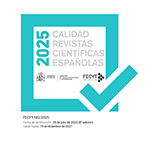On colonialism and other demons. Phoenicians in the South of the Iberian Peninsula between the 9th and 7th/6th centuries B.C.
Abstract
By the end of the 9th century BC, Phoenicians set up permanent settlements around the Mediterranean Basin. This study aims at discussing how European colonialism has influenced the way in which we understand Phoenician contact with native populations. Because Mediterranean archaeology has always paid more attention to the colonizers than to the relationships established with the people who lived in those territories, this paper starts with an analysis of colonial terminology to evaluate its roots and the impact of European imperialism in concepts such as “colony” and “orientalizing” period. This is followed by an examination of postcolonial views of cultural contact situations through material culture in South Iberia between the 9th-7/6th centuries BC. The paper culminates with an appraisal of the relationship between Phoenicians and the inhabitants of South Iberia, questioning Phoenician “colonialism” during that period.Downloads
Article download
License
In order to support the global exchange of knowledge, the journal Complutum is allowing unrestricted access to its content as from its publication in this electronic edition, and as such it is an open-access journal. The originals published in this journal are the property of the Complutense University of Madrid and any reproduction thereof in full or in part must cite the source. All content is distributed under a Creative Commons Attribution 4.0 use and distribution licence (CC BY 4.0). This circumstance must be expressly stated in these terms where necessary. You can view the summary and the complete legal text of the licence.










